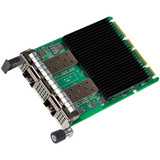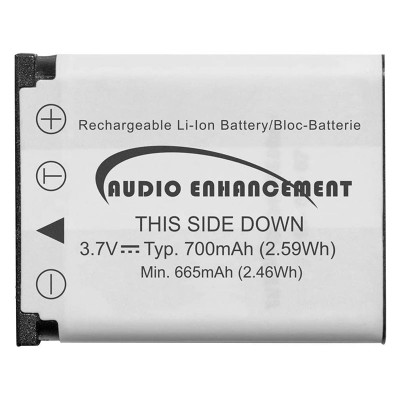Intel® Ethernet 800 Series network adapters improve application efficiency and network performance with innovative and versatile capabilities. With two 25GbE SFP28 ports and key performance optimizations, the E810-XXVDA2 for OCP 3.0 supports solutions across Cloud, Enterprise, and Communications.
The OCP NIC 3.0 specification defines a standardized design for a new generation of network adapters. Simple and straightforward form factors, clear manageability requirements, and improved serviceability help simplify deployment for current and emerging capabilities.
Performance optimizations and port density for Cloud and Storage deployments
- Application Device Queues (ADQ) provides dedicated traffic queues to reduce latency and increase application throughput
- Dynamic Device Personalization enables protocol- specific traffic acceleration to improve packet processing efficiency and reduce CPU overhead
- iWARP and RoCEv2 support provides high-speed, low-latency, high-throughput connectivity for storage targets and initiators
Accelerated packet processing for Communications workloads
- Enhanced Data Plane Development Kit (DPDK) support increases packet processing speeds
- Dynamic Device Personalization enables protocol- specific traffic acceleration and reduces CPU overhead for emerging high-bandwidth workloads
- IEEE 1588 PTP v2 support enables precise clock synchronization across 5G
Flexible Configurations
Intel® Ethernet Optics, and specification-compliant Active Optical Cables and Direct Attach Cables, can support multiple configurations.
All 800 Series products include these technologies | Greater Predictability at Scale
As modern data centers scale, a key challenge is to provide scalable, predictable application-level performance. Application Device Queues (ADQ) technology improves performance scalability and predictability by dedicating queues to key workloads, delivering predictable high performance through dramatically reduced jitter.
Increasing the predictability of application response times by lowering jitter enables more compute servers to be assigned to a task and can allow more users to access the system, providing a better end-user experience. Even applications that are not large scale can benefit from higher consistency, enabling them to meet service-level agreements (SLAs) more easily.
ADQ enables application-specific data steering, signaling, and rate limiting using an optimized application thread to device data path. This ability to dedicate queues and shape network traffic not only increases performance, it reduces latency and improves throughput.
- OCP NIC 3.0 Small Form Factor
- PCI Express (PCIe) 4.0 x8
- Application Device Queues (ADQ)
- Dynamic Device Personalization (DDP)
- Supports both RDMA iWARP and RoCEv2
- IEEE 1588 Precision Time Protocol (PTP)


































